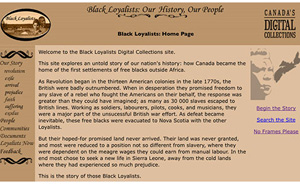talking history | syllabi | students | teachers | puzzle | about us
Black Loyalists: Our History, Our People
http://epe.lac-bac.gc.ca/100/205/301/ic/cdc/blackloyalists/index.htm
Created and maintained by Canada’s Digital Collections Program, Industry Canada.
Reviewed Feb. 1–5, 2009.
This informative and well-researched Web site provides a good overview of an almost forgotten incident in black history. Black Loyalists features a series of electronic essays that outline the story of the African Americans who supported the British during the American Revolution. While not designed for the classroom, the site would provide a sound basis for a student research project and contains several useful links to original documents.

When the British offered freedom to slaves in return for their loyalty in the American War of Independence, they were surprised at the number of blacks who took them up on it. Where they had expected to be reinforced by only a few hundred people of African descent, thousands thronged to the British. The site includes a variety of accounts of the wartime lives of these people, who fought, cooked, and built their way through the conflict. Having risked their lives for freedom, the real problem came when the war was over and the British were defeated: What to do with these troops? They were not the sons and daughters of wealthy merchants, nor were they going to be able to fade back in to a society in which slavery was legal and every black person was subject to discrimination.
The site provides a comprehensive history of the postwar experiences of the surviving black Loyalists. They worked and died for the Loyalist cause only to see many of their lot traded back into slavery as it suited the British to do so. When the British finally decided to make good on the promise of freedom to the remainder of the African American troops, they took many to Canada and most were transported to Nova Scotia. The Africans among them were particularly ill-equipped to deal with the change in climate, but even most of those who had been born on American soil were familiar only with warmer climates. They had no suitable clothing, did not know how to build shelter that would keep them warm in the harsh winter, and the British were not forthcoming with help or supplies. Nova Scotia was already a struggling area, and residents of European descent were complaining that they had been promised grants of arable land and other forms of aid that were not forthcoming. Everyone was hungry, cold, and angry.
The situation later changed. Those African Americans who survived Nova Scotia’s harsh environment and sometimes violently antiblack society eventually took advantage of resettlement opportunities on the African continent—not necessarily where their families had come from, but in British Sierra Leone.
Although text-heavy and somewhat repetitive, the Web site is easy to navigate and well organized. It offers a remarkable exploration of turbulent events. There were no good options for Loyalists of African descent, yet they were able to leave their mark on history.
Madeline Burnside
Frazier International History Museum
Louisville, Kentucky
